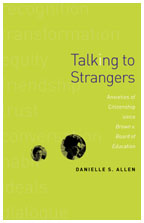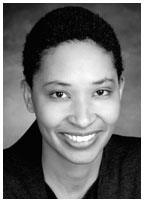November 17, 2004: Reading Room
Danielle Allen ’93 considers how the University of Chicago can build trust with its low-income neighbors. (Brad Baskin) |
Talking
to strangers
Danielle Allen ’93 explores ways citizens work together
in a democracy
By David Marcus ’92
Most political philosophy is meant for consideration rather than implementation. But Danielle Allen ’93’s new book not only inspires reflection, it calls for action. In Talking to Strangers: Anxieties of Citizenship Since Brown v. Board of Education, published by the University of Chicago in September, Allen explores Americans’ distrust of people they don’t know — evoked in the maxim “Don’t talk to strangers” — which, she says, reflects interracial tension, political and personal alienation, and a deep suspicion of others. At the end of her book, Allen, who was appointed dean of humanities at the University of Chicago last spring, looks at her own institution’s strained relationship with its surrounding low-income community and suggests ways the university can improve it.
 Sacrifice,
writes Allen, is the key to bridging the gap of distrust between citizens
and building an effective democracy. Citizens make sacrifices to build
relationships within a democracy, she writes, and a democracy must acknowledge
those sacrifices. She uses as her central example the nine African-American
students who endured social abuse in their attempt to desegregate the
schools in Little Rock, Ark., in 1957. They eventually succeeded in their
mission but not before the Arkansas National Guard was called to keep
them out of the school — and President Eisenhower sent in the 101st
Airborne to get them in. Though the students risked physical harm to make
the U.S. Supreme Court’s decision in Brown v. Board of Education
a reality, the segregated society in which they lived did not honor their
efforts.
Sacrifice,
writes Allen, is the key to bridging the gap of distrust between citizens
and building an effective democracy. Citizens make sacrifices to build
relationships within a democracy, she writes, and a democracy must acknowledge
those sacrifices. She uses as her central example the nine African-American
students who endured social abuse in their attempt to desegregate the
schools in Little Rock, Ark., in 1957. They eventually succeeded in their
mission but not before the Arkansas National Guard was called to keep
them out of the school — and President Eisenhower sent in the 101st
Airborne to get them in. Though the students risked physical harm to make
the U.S. Supreme Court’s decision in Brown v. Board of Education
a reality, the segregated society in which they lived did not honor their
efforts.
A classics major at Princeton who earned a doctorate in classics at King’s College, Cambridge, and another doctorate in political theory from Harvard, Allen moves from theoretical to applied politics at the end of the book in a nine-page letter addressed to the University of Chicago’s faculty senate in which she discusses the institution’s history with its predominantly poor, African-American neighbors in south Chicago. The relationship reflects “a culture of distrust now several decades old,” she says.
In the early years of the civil rights movement, Allen says, the University of Chicago alienated the surrounding community by imposing a redevelopment plan without its assent. The plan physically cut the campus off from its neighbors. The campus police force is the public face the university presents to much of the community — not a way to build trust, Allen writes. The university still has difficulty recruiting African-American students from its home city because of the resulting suspicion, she says.
The situation in Chicago has improved in recent years, Allen writes,
but there is much work to do. She has set up a new branch of the humanities
division to implement the kinds of projects and policies she proposes
in her book, including greater sharing of the university’s resources
with the community, by offering access to libraries and athletic facilities
or establishing satellite campus sites in the area. The resulting goodwill
will allow the university to spend less on police and more on education
— a “peace dividend,” Allen calls it. ![]()
David Marcus ’92 is a frequent PAW contributor.
BOOK SHORTS
 Interglacial: New and Selected Poems & Aphorisms —
James Richardson ’71 (Ausable Press). The author includes poems
from his previous books and new poems about war, death, TV news, ghosts,
snow, and the end of the world. Among his 150 aphorisms is number 70:
“A strength is a weakness in disguise.” Richardson is a professor
of English and creative writing at Princeton.
Interglacial: New and Selected Poems & Aphorisms —
James Richardson ’71 (Ausable Press). The author includes poems
from his previous books and new poems about war, death, TV news, ghosts,
snow, and the end of the world. Among his 150 aphorisms is number 70:
“A strength is a weakness in disguise.” Richardson is a professor
of English and creative writing at Princeton.
 Citizen’s Primer for Conservation Activism: How to Fight Development
in Your Community — Judith Perlman ’73 (University
of Texas). In this hands-on guide for stopping undesirable development,
the author outlines how to devise a strategy, influence local government,
raise money, and conduct a media campaign. Perlman has led several efforts
to defeat development near her Wisconsin home.
Citizen’s Primer for Conservation Activism: How to Fight Development
in Your Community — Judith Perlman ’73 (University
of Texas). In this hands-on guide for stopping undesirable development,
the author outlines how to devise a strategy, influence local government,
raise money, and conduct a media campaign. Perlman has led several efforts
to defeat development near her Wisconsin home.
 Krav Maga: An Essential Guide to the Renowned Method —
for Fitness and Self-Defense — David Kahn ’94 (St. Martin’s).
In this guide, the author explains the background and philosophy of “krav
maga,” a self-defense technique developed by the Israeli military,
and the specific moves, from kicks to groin strikes, that one can use
to fight off an attacker. Kahn teaches krav maga in New York City.
Krav Maga: An Essential Guide to the Renowned Method —
for Fitness and Self-Defense — David Kahn ’94 (St. Martin’s).
In this guide, the author explains the background and philosophy of “krav
maga,” a self-defense technique developed by the Israeli military,
and the specific moves, from kicks to groin strikes, that one can use
to fight off an attacker. Kahn teaches krav maga in New York City.
K.F.G.
For a complete list of books received, click here.

